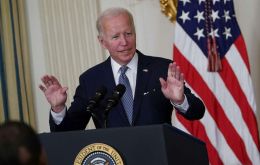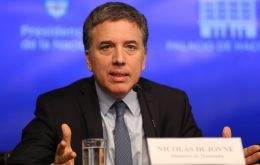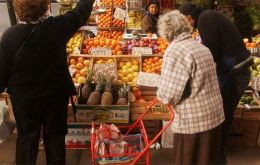MercoPress. South Atlantic News Agency
Tag: Inflation
-
Thursday, September 15th 2022 - 10:15 UTC
Fuel prices help tame, slightly, UK August inflation but food prices keep soaring

The United Kingdom consumer price index rose 9.9% annually in August, compared to 10,1% in July, according to estimates published on Wednesday by the Office for National Statistics, below a consensus forecast of 10.2%, but food prices continued to rise at its fastest pace since 2008.
-
Tuesday, September 6th 2022 - 09:58 UTC
Uruguayan FM off to brokering Mercosur deal approval with EU

Uruguayan Foreign Minister Francisco Bustillo is off on a European tour seeking to further develop his country's trade ties as the last inflation index showed the government of President Luis Lacalle Pou was already above its 2022 targets.
-
Saturday, August 27th 2022 - 09:51 UTC
Federal Reserve pledges to keep lowering inflation, “until we are confident the job is done”

The chairman of the Federal Reserve, Jerome Powell said on Friday that the job of lowering inflation is not done, and “we will keep at it until we are confident the job is done”. Powell was speaking at the Fed's annual conference in Jackson Hole, Wyoming, an event closely followed by markets and pundits, trying to anticipate future actions.
-
Wednesday, August 24th 2022 - 09:31 UTC
Inflation in Argentina hits working-class neighborhoods harder

According to a report by the Institute of Social, and Economic Research (Isepci) released Tuesday, inflation in suburban Buenos Aires where most working-class people reside, reached 11% in July, which is tantamount to saying it was 5 percentage points above the country's 6% average as per National Institute of Statistics and Census (Indec) figures.
-
Wednesday, August 17th 2022 - 09:01 UTC
US: Biden signs Inflation Reduction Act into law

US President Joseph Biden Tuesday signed into law his Inflation Reduction Act concerning growing prices inflation, climate change, and other targets, which. He said it was one of the ”most significant laws in our history.
-
Saturday, August 13th 2022 - 03:32 UTC
Former Economy Minister wants Argentines to retire older

Former Argentine Economy Minister Nicolás Dujovne said people should retire at age 68, regardless of their sex, in a country where under current legislation men do so at 65 and women at 60.
-
Friday, August 12th 2022 - 10:30 UTC
Hectic July shoots up Argentina's inflation

After having almost three economy ministers in one month, it was no surprise to see Thursday that July's inflation was the highest since 2002, as the National Institute of Statistics and Census (Indec) released its latest report.
-
Friday, August 12th 2022 - 09:32 UTC
BCRA raises interest rates to bring down inflation projections

Argentina's Central Bank (BCRA) Thursday decided on a sharp rise in interest rates to calm down inflation projections. The measure was taken before data for July 2022 was released later in the day.
-
Thursday, July 14th 2022 - 20:13 UTC
June's CPI rose 5.3% in Argentina

Argentina's National Institute of Statistics and Census (Indec) Thursday released its monthly report, which showed that the Consumer Price Index (CPI) had risen 5.3% in June 2022, after a 5.1% increase in May for a 64% yoy adjustment and 36.2% in the first half of 2022.
-
Thursday, June 30th 2022 - 09:43 UTC
Uruguay expanded 4,4% in 2021 and is poised to continue growing strongly, IMF report

An IMF mission recently visited Uruguay to discuss with local authorities economic developments, including recovery from the pandemic, the war in Ukraine and the country's policy priorities. The report released on return of the IMF mission to Wahsington pointed out that the economic recovery continues at a firm pace supported by high agricultural commodity prices and strong investment.
